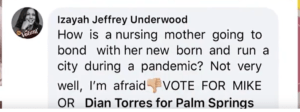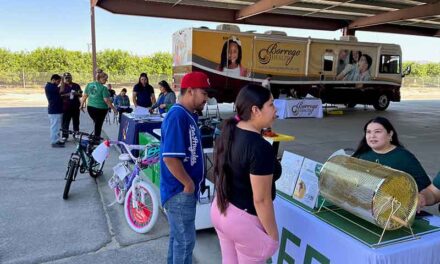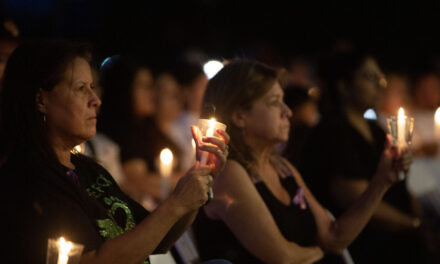Holstege: ‘It’s important for all of us to know we still have a long way to go.’
PALM SPRINGS – Coachella valley women made historic gains in the Nov. 3rd election, but Mayor Pro Tem Christy Holstege, who was among those making history, told Uken Report that “it’s important for all of us to know we still have a long way to go.”

Mayor Pro Tem Christy Holstege
Holstege, who held off two challengers to win re-election to a second term in District 4, will be sworn in today, Thursday, Dec. 10, as the first female mayor in the city of Palm Springs. She is also the first openly bisexual mayor in the nation,
Also in Palm Springs, Lisa Middleton, who in November 2017, was the first out transgender person elected to a non-judicial office in California, ran unopposed in her bid for re-election. It is the first time since at least 2005 that a candidate for Palm Springs has run unopposed.
In Palm Desert, Karina Quintanilla made history by becoming the first Latina elected to the City Council.
In Coachella, Denise Delgado overcame personal attacks – from women no less – to become the top vote-getter in a four-person race while ousting a pair of incumbents in the process.
In Cathedral City, incumbent Rita Lamb handily held back her challenger, Alan Carvalho, and his attack mailer to win re-election. And, political newcomer Nancy Ross bested her male opponent.
Indio City Council incumbent Lupe Ramos Amith kept two male challengers at bay to win re-election.
Linda Evans in La Quinta bested her male challenger to win re-election as mayor.
Donna J.H. Griffith and Kimberly Muzik won two of three open seats in Indian Wells.
By any measure, Coachella Valley women did well, but it’s not enough, according to Holstege.
“I think it’s important to note that across the country and even across the state in California, women still hold about 30% of city council seats,” Holstege told Uken Report. “So even though we’re over 50% of the population in the Coachella Valley, we really haven’t” made a lot of gains in equal representation. We are seeing wins and historic firsts, but it’s important for all of us to know we still have a long way to go.”
We need to do everything we can to support candidates who are running, she said.

One of the many attacks on Christy Holstege during her 2020 campaign,
“We face so many barriers. It’s so much harder. You saw that in my race. All of these attacks,” Holstege said. “I’ve talked to my colleagues who serve as elected women, as council members, and we face barriers there. Personally, I’m usually the only woman in most meetings. We have a long way to go. I just think it’s really important to support, come together, support female candidates, and then also not to engage in attacks against our own community.”
As of June 2020, among the 100 largest cities in the U.S., 27 had women mayors, according to the Center for American Women and Politics. Six are Black women (Keisha Lance Bottoms, Atlanta, GA; Muriel Bowser, Washington, DC; London Breed, San Francisco, CA; LaToya Cantrell, New Orleans, LA; Lori Lightfoot, Chicago, IL; Vi Alexander Lyles, Charlotte, NC); two are Latina (Mary Casillas Salas, Chula Vista, CA; Regina Romero, Tucson, AZ); and two are Asian Pacific Islander women (Karen K. Goh, Bakersfield, CA; Lily Mei, Fremont, CA).
As of June 2020, per CAWP data and the U.S. Census, of the 356 mayors of the U.S. cities with populations 100,000 and over, 76, or 21.3%, were women. Of the 1,621 mayors of U.S. cities with populations 30,000 and above, 378, or 23.3%, were women. Read the full list here.
Image Sources
- Christy Holstege: Christy Holstege
- Attack on Christy Holstege: Facebook
- Female candidate: Pixaby







